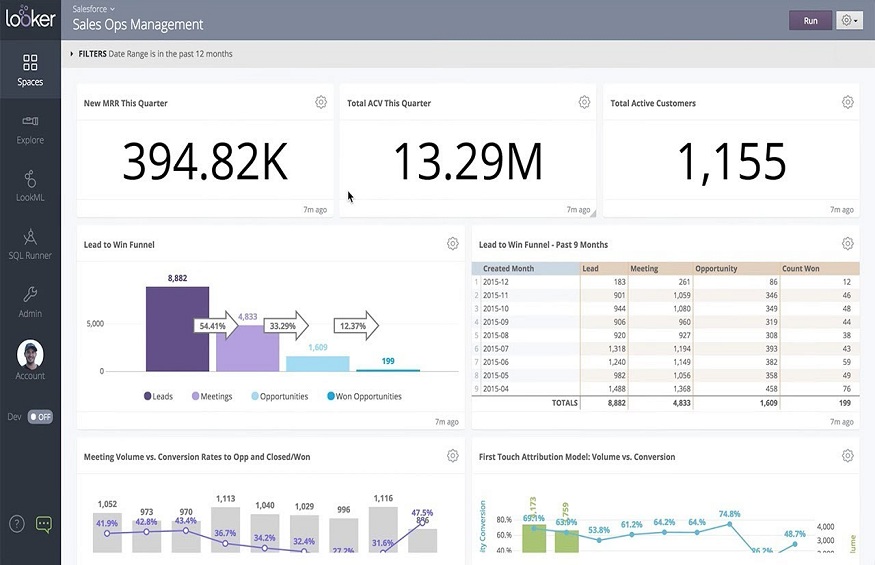Business Intelligence (BI) software offers exposure to and interpretation of information used to make business decisions. These tools can provide a greater idea of your organization’s main metrics and drivers of these metrics through automation and visualisation. Among the plenty of the BI tools available, looker is the most prominent tool for performing advanced data analytics for your business. If you want to get exact knowledge on the looker and how it helps in taking optimized business decisions, the Looker Training is must and should.
What is a looker?
Looker is also designed to offer business users the opportunity to conduct self-service analytics, but it is much more advanced and straightforward under the hood. Looker uses an intermediary data modelling layer to define business metrics once for effective use of the entire organisation. If the data modelling framework has been set up by the analytics team, business users can create their own drag-and-drop reports and use visualisation features to explore data without much Looker preparation. Each drag-and-drop analysis also creates a SQL query that describes what’s happening behind the scenes, so it’s not a black box.
Why do you need Looker?
Looker has been set up with companies in mind. We have precise, reliable analytics for everyone—from data scientists to C-suite executives, programme managers to department heads. Looker was designed from the ground up as a digital data platform not only to be used, but also to easily integrate the latest technical advancements to boost your business. Count on Looker to help you make the most of your data when you need it.
Perks of the Looker platform:
Here are some of the important highlights of the looker platform. They are:
At Looker, we agree that better choices are made when everyone can access the right data in the right way. BI and data visualisation solutions were originally developed to create reports and dashboards. A new approach is required to provide data experiences that support all the ways in which modern organisations make decisions.
Looker’s multi-cloud data platform goes through BI to help companies deliver impact through data interactions that suit the way people function. Looker easily integrates into business workflows, integrates into third-party systems and allows businesses to create their own data applications. All while offering world-class business intelligence abilities.
The Looker Platform explores the quality of your data to provide effect insights and develop personalised data experiences for every aspect of your company. Business managers, data analysts, application developers, data scientists, clients and business associates. Everyone who needs data to do their job will benefit from Looker’s capabilities.
Benefits of the Looker:
The important benefits of looker are:
Increased Productivity: Looker improves productivity by expanding the skills of business analysts to any member of the company’s workforce. You can access the database and make a query on any device that supports the HTML5 web standard, which is basically any modern device running Windows, MacOS, iOS, or Android. Essentially, it negates the need for conventional market analysts to expedite the query process.
Analytical visualizations: A major advantage of the Looker platform is its ability to create user-friendly information visualisations in your database. A user-friendly dashboard is available that stores datasets that have previously been used for easy access at a later date.
Collaborative team functionality: Looker also makes it easy to share visualisations that you have produced with colleagues in your company. These visualisations can be accessed using any web browser on apps that offer HTML5, as opposed to apps from other business intelligence firms such as Qlik and Tableau. You have your own room to save reports, including communities in which you can communicate your most relevant metrics with colleagues.
How does a looker improve or help in increasing productivity?
Many organisations have struggled with the scalability of their database query. Large organisations with many offices around the world need access to insightful data to make the right business decisions.
Traditional SQL query is something that business analysts within the corporate IT team must have completed. This query is a slow process as it has to operate manually through query requests from a number of departments on a regular basis. Many who sent a request for review would have to wait for lengthy periods of time to find the details they wanted. This wait ends up slowing business processes and therefore dramatically decreases the agility of the business when dealing with on-the-spot decisions. These delays in consulting big data analytics around your company will significantly reduce productivity.
In addition to the improved availability of Looker across a wide range of devices, it is also more open to the general workforce of the organisation, particularly those struggling with technology. Market analysts will need to have knowledge of the Standardized Query Language in order to communicate with the database and do some big data analysis. Looker utilizes an abstraction layer called LookML, that generates flexible business processes that are simple to understand and versatile with adjustments to your database. LookML reusability is among the most significant advantages of Looker, as business intelligence analysts will have to adapt their SQL code to each query, making it an unreliable way to extract data.
Conclusion:
Looker is a data discovery software that offers creative data exploration features for both large and small businesses. With it they can access a web-based interface where they can easily get real-time insight into their operations HKR Trainings through data analytics. They should build on-the-go reports and make them available to all interested parties, so that other members of the team can contribute to discussions on certain projects and remain on-the-loop when it comes to any progress of their project. Looker will also allow all businesses to use data to shift their business decisions and operations in the right direction. more info to visit: http://thdailymagazine.com/

